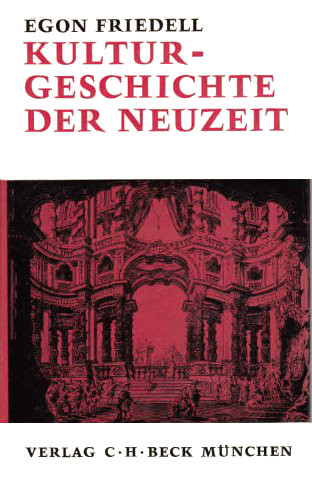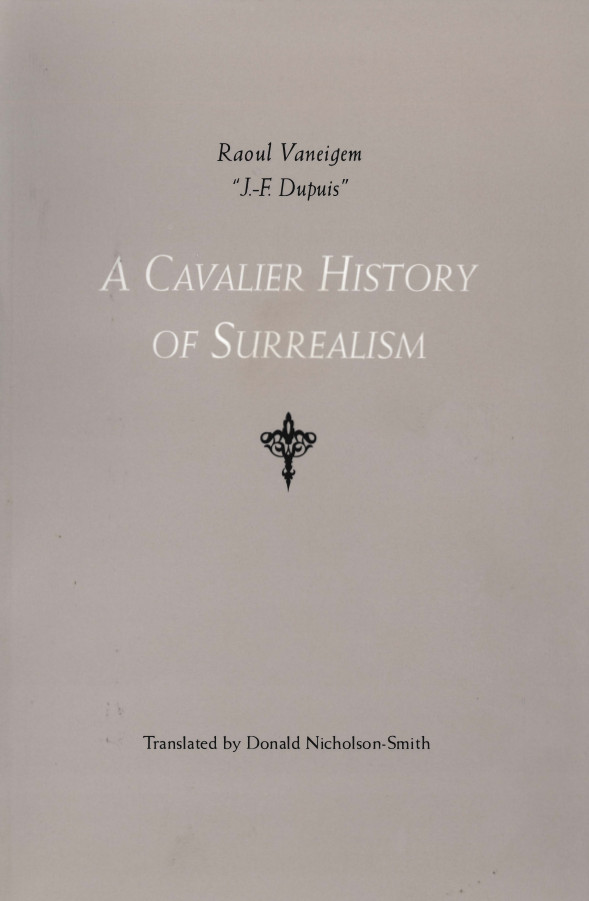Egon Friedell: A Cultural History of the Modern Age (1927–) [DE, EN]
Filed under book | Tags: · aesthetics, art history, cultural history, history, modernity, politics, religion

Austrian essayist, cabaret performer, and amateur cultural historian Egon Friedell is best known for his brilliant, playful, and stimulating magnum opus, A Cultural History of the Modern Age (1927-31), written under the influence of Oswald Spengler and Jacob Burckhardt. He hoped for a rebirth of Western culture; the Modern Age, which was born from the Great Plague of the fourteenth century, has come to its end. At the eve of World War II, Friedell committed suicide by jumping from a window of his apartment. The German writer Thomas Mann ranked Friedell as one of the greatest stylists of the German language.
A Cultural History of the Modern Age, inspired by H.G. Well’s The Outline of History (1920), is dedicated to Max Reinhardt. Its first volume deals with Renaissance and Reformation, the second Baroque, Enlightenment and the French Revolution, and the third part Romanticism, Liberalism, Imperialism, and Impressionism. Friedell’s view is subjective and intuitive – all history is saga and myth and it is nothing more than a difference in degree between historian and poet. “All the classifications man has ever devised are arbitrary, artificial, and false,” Friedell wrote, “but simple reflection also shows that such classifications are useful, indispensable, and above all unavoidable since they accord with an innate aspect of our thinking.” Following the Hegelian lines of though, Friedell sees his subject basically as a the process of spiritual history. Oswald Spengler’s (The Decline of the West, 1918-1922) pessimism and atheism he rejects. From the English writer, historian, and critic Thomas Carlyle (1795-1881) Friedell adopted the romantic “great man” theory of history, the hero-worship, totally ignoring its ominous connection with the political reality of his day. Every era and every generation has according to Friedell its own hero, a genius, who personifies the Zeitgeist, the spirit of the age. Nietzsche was for Friedell the epitome of the pre-WW I era. (from Petri Liukkonen’s short biography of Friedell)
German edition
Publisher Beck, Munich, 1927, 1928, 1931
This edition, Zweitausendeins, Frankfurt am Main, 2009, 1335 pages
English edition
Translated by Charles Francis Atkinson
With an Introductory Essay by Alfred Polgar
Publisher Alfred A. Knopf, 1930, 1931, 1932
Fifth printing, 1953 (Vol 1); Third printing, 1954 (Vol 2); First printing, 1932 (Vol 3)
353 + 457 + 489 pages
via hz40lat46
Review (of Vol 1, Crane Brinton, Speculum, 1953)
Review (of Vols 1-2, International Journal of Ethics, 1932)
Review (of Vol 2, Eli Siegel, Scribner’s Magazine, 1931)
Review (of Vol 3, Robert Briffault, Scribner’s Magazine, 1932)
Review (of Vol 1, C. Hartley Grattan, The Forum, 1930)
Review (of Vol 1, David Owen, The Saturday Review, 1930)
Review (of Vol 2, The Saturday Review, 1932)
Review (of Vol 3, Alfred M. Frankfurter, The Bookman, 1932)
Wikipedia (DE)
Kulturgeschichte der Neuzeit; Kulturgeschichte Ägyptens (German, 1927-31/2009, at Archive.org)
A Cultural History of the Modern Age, Volume I, Volume II, Volume III (English, trans. Charles Francis Atkinson, 1930-32, no OCR)
Isabelle Stengers: The Invention of Modern Science (1993–) [EN, PT]
Filed under book | Tags: · apparatus, epistemology, event, fact, fiction, history of science, mathematics, philosophy of science, physics, politics, science, sociology, theory, truth

The so-called exact sciences have always claimed to be different from other forms of knowledge. How are we to evaluate this assertion? Should we try to identify the criteria that seem to justify it? Or, following the new model of the social study of the sciences, should we view it as a simple belief? The Invention of Modern Science proposes a fruitful way of going beyond these apparently irreconcilable positions, that science is either “objective” or “socially constructed.” Instead, suggests Isabelle Stengers, one of the most important and influential philosophers of science in Europe, we might understand the tension between scientific objectivity and belief as a necessary part of science, central to the practices invented and reinvented by scientists.
First published in French as L’Invention des sciences modernes, La Découverte, Paris, 1993.
English edition
Translated by Daniel W. Smith
Publisher University of Minnesota Press, 2000
Theory Out of Bounds series, 19
ISBN 0816630569, 9780816630561
185 pages
Review (Robert Evans, Contemporary Sociology, 2002)
Commentary (Stephen Shaviro, 2004)
Publisher (EN)
Google books (EN)
The Invention of Modern Science (English, trans. Daniel W. Smith, 2000)
A invenção das ciências modernas (Portuguese, trans. Max Altman, 2002)
Jules-François Dupuis (Raoul Vaneigem): A Cavalier History of Surrealism (1977–) [DE, EN, RU]
Filed under book | Tags: · art, art history, communism, mysticism, politics, subversion, surrealism

“A down-and-dirty survey of the Surrealist movement written under a pseudonym in 1970 by leading Situationist theorist Raoul Vaneigem.
Intended for a high school readership, and dashed off in two weeks, Vaneigem’s sketch bars no holds: disrespectful in the extreme, blistering on Surrealism’s artistic and political aporias, and packed with telling quotations, it also gives respect where respect is due.
Locating Surrealism’s “original sin” in its ideological nature, Vaneigem clearly identifies the “radioactive fragment of radicalism” that the movement never managed completely to shed. If you want an unequivocal answer to the question—”What was living and what was dead in Surrealism?”—look no further.
And for readers interested in the Situationists, this short book sheds a great deal of light on their attitudes, negative and positive, towards their Surrealist predecessors.”
First published in French as Histoire désinvolte du surréalisme, Paul Vermont, Nonville, 1977.
English edition
Translated by Donald Nicholson-Smith
Publisher AK Press, 1999
ISBN 1873176945, 9781873176948
131 pages
via ZineLibrary.info, HT esco_bar
Review: Frédéric Thomas (Dissidences, 2013, FR)
Publisher (EN)
Publisher (FR, 2013)
Publisher (RU, 2014)
German: PDF (trans. Pierre Gallissaires and Hanna Mittelstädt, 1979, 160 MB, added on 2020-8-28)
English: PDF, HTML, PDF (trans. Donald Nicholson-Smith, 1999)
Russian: PDF (trans. Maria Lepilova, 2014, added on 2020-8-28)

